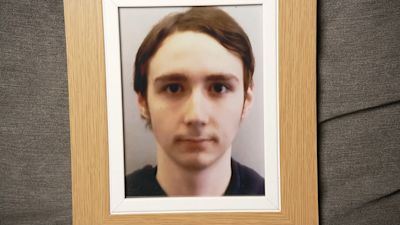'He needed that help': Mum tells of anguish after son took his own life following cut to benefits

ITV News Correspondent John Ray spoke to two families about the Department for Work and Pensions' handling of withdrawing benefits to their children - who took their own lives
It takes an act of great bravery for Helen Featherstone to talk about her son's death.
"It still feels just as raw as it did on the day," she tells ITV News. It’s the first time she’s spoken publicly about a harrowing sequence of events that still haunt her.
"I think of how we found him on his bed. I didn’t know if he was asleep. I touched his arm and he was cold. It never leaves you. It’s there all the time."
Ker was 21 years old. The last few weeks of his life had been a torment to an already troubled soul.
Once a bright eyed and loving young boy, in adolescence, Ker was plagued by anxiety and after the accidental death of a sister and, on the same day, his best friend, he descended into a crippling depression.
He abandoned his studies and ambition to be a doctor. So complete was his mental collapse that he was most days unable to leave his flat.
Ker's mum Helen tells ITV News the DWP took 'his lifeline away'
In 2019, the Department for Work and Pension decided to review his Personal Independence Payment – a disability benefit he relied upon, which involved a face-to-face assessment.
"It was just awful for him. He was so unwell," said Helen.
Her son was self-harming. He had ulcerated injuries on his arms, chest and back.
"It was just tick box questions. Do this, do that. Stand up, sit down. They didn’t see the sores under his shirt. They didn’t know the pain he was in."
At the beginning of May that year, the DWP wrote to say his entitlement was being cut by £90 a week.
"He said, 'Mum, they don’t care about people like me'," remembers Helen.
"He’d already tried to take his own life. I wrote to the DWP. I was so worried.
"He was so vulnerable. He needed that help. He needed that care. They took his lifeline away," she added.
This is not an isolated tragedy. A National Audit Office report has identified at least 69 suicides related to benefit problems in recent years.
Among them, Jodey Whiting, a 42-year-old mother of nine children, who had suffered and survived many years of mental and physical illness.
She had been hospitalised by pneumonia when news came from the DWP that she had been judged fit to work.
"It was unbelievable. She cried. She said, 'Ma’am, they say I’m fit for work but I can’t walk out of the door. I can’t breathe'," says her mother, Joy Dove.
"I found letters she wrote. No money. Can’t pay the bills. This is the life of Jodey Whiting. She just gave up hope," Joy recalls.
Jodey’s Employment and Support Allowance was ended. As a consequence, she lost her housing and council tax benefit.
An independent inquiry judged the DWP guilty of breaking its own rules. It was ordered to apologise and to pay compensation.
But Jodey’s family do not want others to go through their anguish.
In the coming days, they hope for a significant ruling at the High Court; to allow a second inquest that this time, they believe, would officially apportion blame to the DWP and hasten the case for reform.
In a statement the Department of Work and Pension told us: "Our condolences are with Ms Whiting’s family and Mr Featherstone’s family.
"We support millions of people a year and our priority is they get the benefits to which they are entitled promptly and receive a supportive and compassionate service.
"In the vast majority of cases this happens but when, sadly, there is a tragic case we take it very seriously, learn lessons and make changes to our systems where necessary."
But two years separate the death of Jodey and Ker and that suggests that at best lessons have been slow to be learnt.
The mental health charity MIND tells us fundamental change is needed urgently.
Helen Featherstone agrees.
Two months after her son’s death, two months too late, the DWP wrote to reverse their decision to cut his benefits.
"They don’t treat people as human beings, but as numbers or code on a computer system,
"Ker told me the process made him feel worthless. He deserved so much more. To be listened to. To be believed. To be helped."
Where can you go to get help?
The NHS and several charities across the UK offer various resources and helplines for people who need help and for people who think someone they care about needs support.
Mind has a helpline on 0300 123 3393.
The Samaritans, which helps people who feel suicidal can be contacted on 116 123.
YoungMinds who support young people with mental health issues can be contacted on 0808 802 5544.
The NHS has a resource page offering various routes to support here.